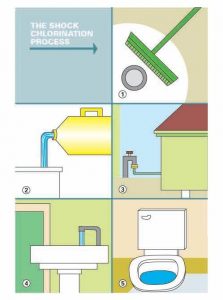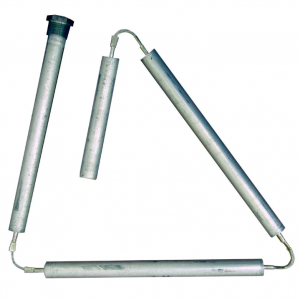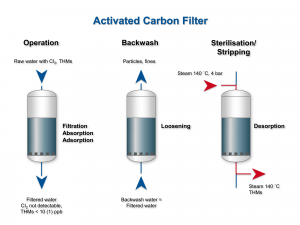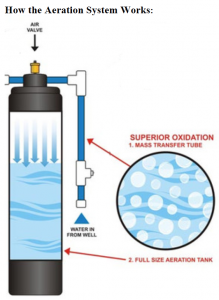Table of Contents

Hydrogen sulphide is an agent that is present in the water as a natural condition but the smell is caused by the bacteria who feed on the sulphur present in the water under the ground usually because there is less presence of oxygen in the underground systems and wells.
These problems with hydrogen sulphide present in the water usually occur when the well is drilled into sandstone or an acidic component. Although these bacteria do not cause any health-related problems for human consumption, they do give water a bad smell that is hard to ignore and get rid of unless the water I treated in some way.
Here’s a detailed insight on the topic:
5 Ways To Get Rid Of Hydrogen Sulphide In Water
Listed below are some methods you can easily get rid of hydrogen sulphide in water;
Shock Chlorination
At the start, you need to identify if your water has the sulphur-reducing bacteria, you can know if your water has a bad egg odour emerging from it. The first step in the process is to add a high amount of daily household bleach to your underground water system and let it circulate and sit in the system for at least two days then flush it out afterward.
What differentiates shock chlorination from the ordinary chlorination process is that the concentration, amount, and level of contact of chlorine is 4 times higher than what the city water supply is treated with. If used effectively, the shock chlorination process effectively eradicates all disease-causing bacteria including the sulphur ones to get rid of the hydrogen sulphide in the water.
Aluminium water heater rod
Here’s a different scenario, what if you only smell the sulphur in water when you use the hot water tap? Well, there’s an explanation for that as well, if you use a magnesium rod, chances are that the magnesium reacts with the hot water to produce hydrogen sulphide and this is what causes the problem.
The easiest solution is to replace the magnesium water heater rod with either aluminium or a zing heater rod especially if you are using the water temperature around 6 degrees celsius. Make sure you get the help of a professional who knows exactly what these materials are placed and set up.
Aeration
A good aeration system is relatively less expensive than any chemical treatments, if done correctly, it gets rid of the hydrogen sulphide gas present in the water as well as filters out considerable amounts of iron and magnesium from the water.
There is typically a specially designed water tank for the purpose of the aeration process where the water is forced with air and this produces hydrogen sulphide bubbles that are vaporised and trapped in the upper pockets of the tank and released outside before the water is supplied throughout the entire house.
Activated carbon & catalytic carbon
The use of carbon filtration depends on the amount of hydrogen sulphide present in the water, if it is around 1.0mg/l, in such a case activated carbon filter is the most effective way to reduce its amounts. The filter works through an adsorption process where the hydrogen sulphide particles are adsorbed on the outer surface of the carbon molecules. This process is quite affordable though it requires an adequate level of maintenance in order to ensure that the water is cleared from hydrogen sulphide.
Another treatment for the removal of hydrogen sulphide is the use of catalytic carbon which uses a process similar to oxidation, where the carbon molecules first trap and adsorb the hydrogen sulphide and later oxidise the gas and this form can be used to treat larger amounts of hydrogen sulphide present in water systems. This process has relatively less maintenance than activated carbon but requires frequent backwashing.
Ion Exchange
The ion exchange process is most commonly witnessed in the use of water softeners where the hard water minerals are usually exchanged with sodium chloride ions in order to soften the water. The hydrogen sulphide gas present in the water is also present in the form of an ion, so the ion exchange process is considered most essential.
Here, the packed bed anion exchange takes place, where the resin beds are ionically charged, when the hydrogen sulphide is filtered through, the ions are exchanged and replaced with odourless alternatives.
FAQS
How does hydrogen sulphide affect the household?
Though it is harmless for drinking, the hydrogen sulphide gas is dangerous and harmful to the health of pipelines, damaging its composition, especially when it is combined with the iron present in the pipelines. It also affects washed clothes, bathrooms, and kitchen utensils and oftentimes clogs up the drainage lines.
Is hydrogen sulphide a poisonous gas?
It is a harmful and dangerous gas only when it is present in a high amount or in concentrated levels in the water as well as in the air. Usually, you can smell it from afar and in the water, like a highly chemical concentration. It is also known to cause suffocation. But drinking it in low amounts is okay unless you have issues with the pungent smell.
Final Thoughts
Hydrogen sulphide is a gas naturally present in the well or underground water as we call it, it turns the water into a yellow shade and smells bad enough to avoid it. Most house owners get scared of its presence because they usually do not know how to get rid of it. I hope this article helped you go through different methods to get rid of hydrogen sulphide in water. It is not a high concern until it affects your entire household.




